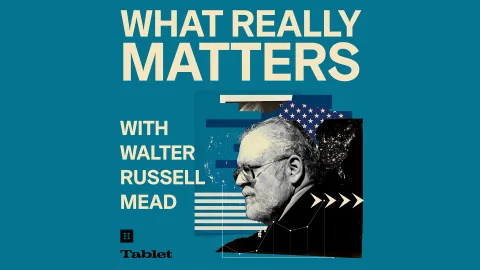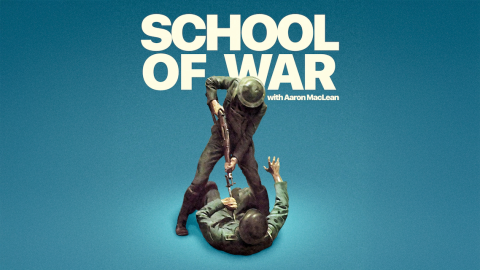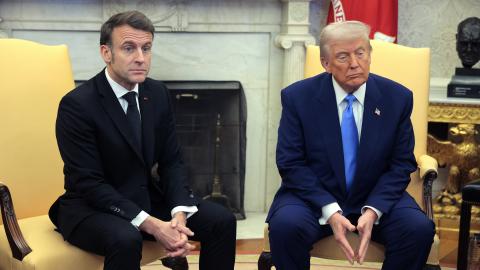
In-person attendance is by invitation only.
Event will air live on this page.
Nikki Haley on the Dangers of National Security Weakness
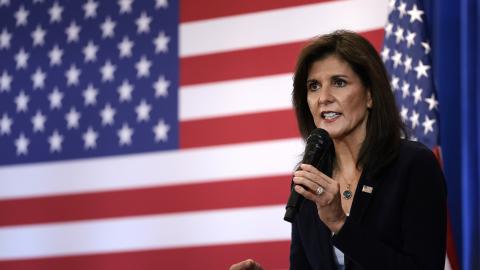
In-person attendance is by invitation only.
Event will air live on this page.

Walter P. Stern Chair
Nikki R. Haley is the Walter P. Stern Chair at the Hudson Institute.

Senior Fellow and Director, Center on Europe and Eurasia
Peter Rough is a senior fellow and director of the Center on Europe and Eurasia at Hudson Institute.

Chair, Hudson Institute Board of Trustees
Sarah May Stern is chair of the Hudson Institute Board of Trustees.
Join Hudson in welcoming Ambassador Nikki R. Haley for her inaugural event as the Walter P. Stern Chair. She will deliver a special address on United States foreign policy amid wars in the Middle East and Europe and growing tensions in Asia. Following her remarks, she will sit down with Hudson’s Peter Rough for a fireside chat.
Hudson Board of Trustees Chair Sarah May Stern will deliver introductory remarks.
Event Transcript
This transcription is automatically generated and edited lightly for accuracy. Please excuse any errors.
Sarah May Stern:
Good afternoon. I am Sarah May Stern, and I am very proud to be here today as chair of Hudson Institute to introduce Hudson’s new Walter P. Stern Chair, Nikki Haley.
My dad, Wally P. Stern, believed that America was a great country. Great because it was a land of freedom. Great because it was grounded in opportunities for those who worked hard and had ingenuity. Great because it stood up front and center for these values, in a world where people may have misplaced their optimism and their sense of right and wrong. He knew how vital a strong America was.
When my dad heard Herman Kahn speak in the late ’60s, he was struck by Herman’s commitment to these values. Herman was the founder of Hudson Institute. My dad was impressed by his brilliance and by Herman’s ability to integrate different strands of thinking to formulate strategies to make the world a better place, thus was born in my dad a lifelong commitment to Hudson Institute. Thank you. So I know that right now, my dad would be so proud that Nikki Haley is the next Walter P. Stern chair at Hudson.
Don’t the characteristics I just enumerated describe Nikki Haley and her career? Nikki was a governor who united South Carolinians and brought businesses to South Carolina, a fierce advocate for the United States and its ally, Israel, in the United Nations, an optimist who wants the best for our country, tenacious and brilliant on the campaign trail, and someone who is thoughtful, willing to listen to others, and believes in Hudson’s mission to promote American leadership for a secure, free, and prosperous future.
Now, Nikki’s going to get up and give a talk in a minute, but I think it’s really fitting that Nikki’s first conversation at Hudson as the Walter P. Stern chair is with senior fellow, Peter Rough. Peter heads up Hudson Center on Europe and Eurasia. In the early ’80s, my dad and brother furtively called on refuseniks, Jews in the Soviet Union, whose request to immigrate had been denied, and whose lives were really terrible as a result. Dad’s disgust for the communist regime in the Kremlin was palpable. Today, a different regime rules in the Kremlin, but it’s still nefarious, and Peter knows more about its actions than just about anybody else. I look forward to hearing what Nikki and Peter have to discuss. So now, please join me in welcoming Nikki Haley to the podium.
Nikki Haley:
Thank you so much. Thank you, Sarah, for those kind words, for your friendship, and for your leadership here at Hudson, and thank you for the immense contributions that you and your family have made to the cause of freedom. It’s an honor and a true privilege to hold the Walter P. Stern chair, and I will work hard to make you proud. I also want to acknowledge several ambassadors I had the pleasure of serving with at the United Nations that took time to come and be here today, Karen from the United Kingdom, Mariangela from Italy, Juan Jose from Mexico, Audra from Lithuania, and Georgie from Bulgaria, as well as Kelley Currie, who was my ambassador at the United Nations as well. It’s great to see all of you again, and it was a pleasure to serve with you.
It’s good to be back at Hudson. I hope the past year made it even more clear how passionate I am about the future of our country. Hudson is an amazing partner in this work, and I look forward to our work together, defending the country we all love. We certainly have a lot of work to do. The last time I spoke here was four years ago. I warned about the rising hostility of capitalism and economic freedom on both the left and the right. I said it threatened our prosperity as a people, and our security as a nation. It still does.
Today, I have a similar warning. Once again, a dangerous worldview has risen on both sides of the aisle. Once again, it threatens our prosperity and security. We need to take this one seriously. A growing number of Democrats and Republicans have forgotten what makes America safe. A loud part of each party wants us to abandon our allies, appease our enemies, and focus only on the problems we have at home. They believe if we leave the world alone, the world will leave us alone. They even say ignoring global chaos will somehow make our country more secure. It will not. This worldview has already put America in great danger, and the threat is mounting by the day.
I have always spoken in hard truths. If we don’t remember the path to peace, war will come to America, and it will claim countless lives. We have to prevent war. We have to keep Americans safe. This danger has been building for many years. It became blatantly obvious two weeks ago today. That’s when Joe Biden withheld critical weapons from Israel. Those weapons are important for defeating Hamas, but they also matter for another reason. Withholding them validates the totally false and destructive narrative that Israel is acting unjustly by defending herself. In truth, Israel is conducting its war of self-defense more humanely than any army in history, and they are doing so against an enemy that uses its own civilians as human shields.
I can hardly imagine a more foolish move than Joe Biden withholding weapons from one of our closest allies, and it comes after more and more Democrats have turned on Israel. Dozens of liberals deserted Israel when Congress voted for the military aid last month. Now, the leader of the Democratic Party is moving in their direction. Biden thinks he’s stopping a war. In fact, he’s dragging out a war, emboldening terrorists, and making other wars more likely. This isn’t hard. Israel is fighting America’s enemies, not just Hamas, but also Hezbollah, the Houthis, and most of all, Iran. When Biden says he won’t give weapons to Israel, all those enemies hear is that attacking Israel just got easier. They can kill as many Jews as they want. After a few months of outrage, America will tire and move on.
Biden has also emboldened Iran to attack the rest of our allies in the Middle East. That makes them question whether they can ever trust what America says. If we withhold help from Israel, why would the Saudis, Emiratis, or Jordanians ever feel like they could trust us as friends? This only pushes them into the arms of Russia and China. Biden just gave our enemies a green light for more bloodshed. If he won’t stand with Israel for more than a few months, why should Russia think we’ll stand with Ukraine much longer? And China has greater confidence that we’ll abandon Taiwan and other Asian allies. Our enemies are betting that if they attack our allies, we’ll make a lot of noise, then quiet down and walk away. We’ll go from standing strong, to issuing strongly worded press releases, to throwing our friends under the bus, and while we dither, our enemies will expand at our expense.
This is the face of weakness, and it’s the logical extension of Biden’s surrender in Afghanistan during his first year in office. In two weeks, he threw away two decades of sacrifice from American heroes. That includes my husband, Michael, who served in Helmand Province, who’s finally back from Djibouti, somewhere in the audience. There you are. I wish Biden had heeded the warnings about Afghanistan that I know he received. Instead, he told our enemies we’d ignore our friends, and compromise our own national security just to meet a political deadline. Guess what? They took Biden at his word.
Since the fall of Afghanistan, North Korea has gotten more aggressive towards South Korea and Japan, China is preparing to invade Taiwan, and of course, Iran and Russia have already started wars of their own. Without the Afghanistan debacle, Iran would’ve thought twice before letting Hamas attack Israel. For that matter, Russia likely would not have invaded Ukraine. The Israel betrayal is the bookend of the Afghanistan surrender. In both cases, the consequences of Biden’s lack of resolve will be felt worldwide.
It’s true that the President has supported assistance to Israel and Ukraine, but we can’t forget that his failed policies made that assistance necessary in the first place. Look at what Biden has done in Ukraine. He did nothing, nothing, to deter the invasion. When the tanks rolled in, he assumed Ukraine would fall within days. And while the Ukrainians have proven to be amazing fighters, Biden refuses to help them win. He gives them just enough to survive, while Russian missiles and tanks grind their country to dust. It seems like the president wants a negotiated ceasefire, in which Ukraine cedes some of its territory that Russia stole. That will only leave Russia as the winner and wanting more. It will inevitably attack Ukraine again. Ukraine will go the way of Afghanistan, conquered by America’s enemy.
The same goes for Israel. Hamas was better positioned to attack Israel because Biden spent three-plus years appeasing Iran. He eased sanctions, forked over billions of dollars and begged the ayatollahs to get back in the nuclear deal. Biden has given Iran nothing but cash and time. Cash and time it used to strengthen its terrorist proxies. Cash and time it used to get to the brink of a nuclear bomb. Joe Biden’s legacy is already clear. He will go down in history as the commander in chief who refused to stop our enemies. He will be remembered for spending more on national debt interest than national defense. He weakened America while letting China, Russia and Iran grow stronger and he still has time to do even more damage. But all is not well with my fellow Republicans either. Just a few weeks before Biden threw Israel to the wolves, many Republicans in Congress tried to push Ukraine off of a cliff.
All told 112 House Republicans voted against military aid to Ukraine. Thankfully Speaker Mike Johnson showed moral courage and a clear understanding of the stakes. He overcame both Republicans and Democrats to support Ukraine and Israel. Thank God, two countries who are America’s friends and they’re fighting America’s enemies. If they win, we win. If they lose, we lose. Most Republicans understand that when it comes to Israel. Thirty-two Americans were murdered on October 7. Hamas is still holding American hostages. Why no one is talking about that daily, I will never understand. And the radicals on college campuses hate America as much as they hate Israel. That’s why we must stand with Israel without apology. I hope Republicans keep standing strong with Israel to defeat the terrorists, and we must hold the terrorist regime in Iran accountable. After all, Iran isn’t just saying death to Israel, they’re also saying death to America. And they believe they’re making a promise. That included the late president of Iran. That helicopter crash couldn’t have happened to a worse person.
Ebrahim Raisi was responsible for the deaths of thousands of innocents. The people of Iran are off without him. Some Republicans lack the same clarity when it comes to Ukraine. Russia’s dictator has made it perfectly clear that he won’t stop at Kyiv. He wants to recreate the Soviet Union and he’s threatened to attack our NATO allies. We are obligated to defend them, and if Russia attacks American troops will go to war. We must do everything possible to ensure that doesn’t happen. Our goal should always be the prevention of war through strength and moral clarity. Saving our soldiers demands we stand with Ukraine and against Russia, and if we’re going to stop a war in the Pacific, we have to win the war in Europe. No one is watching Ukraine more closely than China. No one is watching Israel more closely either. If we throw in the towel, China will assume it can invade Taiwan with impunity. China is waiting to see if America is stupid enough to throw away the Middle East, Europe and the Asia Pacific all at the same time.
But China isn’t just waiting. President Xi is actively coordinating with Iran and Russia. China props up the Iranian economy so it can keep sowing chaos in the Middle East. China props up the Russian military to help destabilize Europe. Xi Jinping will keep supporting our enemies because it undermines America. A fourth-grade bully gets it, even if a fourth-term congressman doesn’t. Now, I’m sympathetic to many of my fellow Republicans’ concerns. They say we need to end the crisis at our southern border. That’s absolutely true, and there’s an immediate need for action. Biden has given illegal immigrants and drug runners, the green light to flood our country and kill our children. Securing the border is a national necessity. Our safety and security demand it. But Republicans are wrong when they say we have to fix the border before doing anything else. We shouldn’t pretend we can only solve one problem at a time. If that’s how we think, we have a long list to get through.
We need to fix our broken education system. We need to end inflation and give working families relief. We need to get runaway welfare spending under control. We need to stop the crime that sweeping college campuses and destroying our cities. Do these Republicans want us to ignore those issues too? Only until we deal with the border, or is it just support for Ukraine they claim is getting in the way of dealing with our border? This is America. We can do these things at the same time. In fact, we have to. If we try to tackle them one by one, it’ll be decades before we finally get serious about our enemies. By that point, they’ll be even stronger, but we’ll be weaker and defending ourselves will be more expensive, not less. When your enemies are preparing to storm the beach, you don’t bury your head in the sand. I also agree that we should cut foreign aid.
At the United Nations I dealt with plenty of countries that hate America then put their hand out and ask for money. I fought to stop them from getting a cent and I support cutting foreign aid even more. But sending weapons to Ukraine and Israel isn’t foreign aid, it’s an investment in the world in which authoritarian dictators cannot run roughshod over free countries. We should end the war in Ukraine, but that doesn’t mean appeasing Putin. It means sending Ukraine enough missiles, tanks and fighter jets to send Putin packing. We don’t need a forever war. We need a fast war, and we need Ukraine to win this war now. Finally, China is the biggest threat facing America. But biggest threat doesn’t mean only threat, and we must realize that all of these threats are working together. When Japan attacked Pearl Harbor, America didn’t ignore Nazi Germany and fascist Italy, we confronted the Axis powers simultaneously. China, Russia and Iran are the modern day Axis. While China is the senior partner, its fate is closely tied to the junior members.
If we don’t help our friends beat Russia in Europe and Iran in the Middle East, then China will impose its will over Asia and America itself will be in serious jeopardy. Such a crisis is closer than we think. Joe Biden is rushing toward it, and some Republicans would move us toward war as well. By abandoning our allies, they’re aiding our enemies. It isn’t just short-sighted, it’s self-defeating. Our enemies want to crush us. They see a chance to destroy America. The question is, will we let them? We can turn inward, but the outside world won’t leave us alone. Our future will either be shaped by us and our friends, or it will be shaped by our enemies. Failing to act is the worst action of all, and delaying will only lead to more difficult decisions and a greater chance of catastrophe. The times we live in look like the 1930s. Our economy is weak. Our country is divided. Our leaders fail adequately to stand up for our allies, even as our enemies target them and set their sights on us.
We know how that era ended. It ended with a victory, but at a terribly high price. We must never have to pay that price again. And there’s still time to ensure we don’t. The hour is late. We have to face the hard truths and do harder work. But I have faith that we’ll rise to meet the challenge before us. If any country can still make it happen, it’s ours. As my immigrant parents told me and my siblings, we are blessed to live in America. And as every generation of Americans proves, we always rally to defend that blessing. Thank you and God bless.
Peter Rough:
Well, welcome to Hudson.
Nikki Haley:
Thank you. It’s great to be here.
Peter Rough:
Are you prepared for Hudson’s staff and me to go around Washington referring to you as my colleague Nikki in the coming weeks and months?
Nikki Haley:
I prefer Nikki. Others were moments in time. But yes, I’m very much looking forward to the partnership. Hudson is just . . . I always have wanted to surround myself with quality and with courage and with those that have vision for not just this year, but 20 and 30 years out and nothing defines that more than Hudson. Domestic policy, foreign policy, I wanted quality in the people that I was with and I wanted courage that I’m with people who are going to speak the hard truths. I think we need that now in America more than ever.
Peter Rough:
Well, I can see you’re ready for the policy discussion, but before we do that, this is your first time in front of the Klieg lights on stage since—
Nikki Haley:
It is.
Peter Rough:
—exiting the presidential campaign, how is return to civilian life, so to speak? How are you doing?
Nikki Haley:
It’s really good. It was weeks that I was sleeping 10 to 12 hours a day. The first thing I did was catch up on my sleep. I quickly got back to running, which I missed during the campaign. I was able to go and spend time with my parents who live with us and get Michael back home from deployment, which was a blessing. Spend time with the kids. But I suspended truly with gratitude, so much gratitude, gratitude towards the support of my family. Even Michael, who was 8,000 miles away, amazingly supportive. Supportive of my friends who stood by me, supportive of an amazing campaign team led by John Lerner, who is truly not just a dear friend, but a fantastic consultant. Betsy Ankney, you don’t get better than that in a campaign chair. Mary-Kate Johnson, who was an amazing fundraiser. Chaney Denton, who I’ll forever value being our comms director. Leslie DeWeese, who’s with me now, who managed our policy. We just had amazing people who really love America, and so I’m grateful for them and I’m grateful for the millions of people who have voted and continue to support us. So I have no regrets, we left it all on the field. I just have gratitude that I was able to go through the process and fight as hard as I could. And how blessed are we that we can live in a country where we can do that?
Peter Rough:
Well, some of them are here. And I could see them one by one smiling as you mentioned their name, so clearly you’re a tight-knit group and uh—
Nikki Haley:
They’ve earned it. They’ve earned it.
Peter Rough:
So let’s turn to the speech. And there one line that stuck out, and I’ll just quote it as you delivered it, “Our future will either be shaped by us and our friends, or it’ll be shaped by our enemies.” I think there’d be a lot of analysts who would agree with that statement, but they might then ask, “Can the United States pull back from the world and expect our friends and allies to fill the void?” Put it another way, how important is American leadership to this alliance system that we’ve built?
Nikki Haley:
Well, let me put it another way: why would we want to leave our allies? America can never be so arrogant to think we don’t need friends. But you have to be a friend to get a friend. And I look back at 9/11, we needed a lot of friends after 9/11. So one, America should want friends. But I saw at the United Nations, when America speaks the world listens and the world craves that moral clarity. The world craves that leadership. And whether we’re fighting for freedom, whether we’re fighting for democracy, whether we’re fighting for human rights, we owe it to all that is good about America to spread that far and wide. Because if we’re not loud, our enemies will be.
And so, I think it’s just as much a necessity for America to want our allies as it is for our allies to want America to lead, because they don’t want to follow Russia and China. And I will continue to say when America is weak, the world is less safe. And I think we’re seeing that right now.
Peter Rough:
And we have some of our closest trends from the diplomatic corps here. I venture to say if a Russian official or a Chinese official delivered a speech like that, it would be a very Spartan crowd cheering them on in the audience. So, I think that speaks to America’s alliance network and friendships around the world.
One friend and partner, of course has become Ukraine. And on the topic of the war in Ukraine, you gave a very full-throated endorsement of the Ukrainian cause in your remarks. There are too, maybe I can hear some of the howls, faint howls of disappointment from the isolationists who might say, “That’s all well and good, Ambassador Haley, but that’s sort of what we heard about, say, South Vietnam in the 1960s. And that sort of full-throated political support led us on a slippery slope into a conflict that we didn’t want to be in.” How do you answer that charge to them? Or even to just the average American who might out there worry and have some fears watching a full-blown conflict erupting on the European continent?
Nikki Haley:
It’s very different. I mean with Vietnam, we had half a million American troops there. We don’t have that in Ukraine. And they have been amazing fighters, they want to fight this themselves. At that time in Vietnam, there was a lot of internal conflict. Ukraine is very united in the fact that they don’t want Russia to take them over. They’re very united in defending their freedom and defending their country. This is something we should want to do. Why would we want an enemy to beat a friend? I can tell you at the United Nations, Ukraine was an amazing friend to us. They supported us on almost everything. They showed up without me even asking them to be there.
And now they’re not asking for our troops, but this should have been over by now. And why are we just dangling out bits at a time to only allow them to survive, and not work with our allies to give them the tools to win? They have the passion, they have the spirit, they have the ability. What they don’t have is friends stepping up to the plate and having the courage to say, “This is wrong, what Russia has done.”
But not only that, look at what Putin said in one of his national speeches. He said it from his own words at the time of the invasion, “This is not a war on Ukraine. This is a war on the West and NATO.” Putin sees us as morally corrupt. That’s all you should have to hear to know that defending Ukraine is defending ourselves.
Peter Rough:
And the Ukraine debate has expressed itself through our supplemental national security legislation debate, which I’m sure you track closely on your long runs, thinking about national security in the world back in South Carolina. What was your reaction to watching that debate, that long, arduous journey that ultimately played out successful, that passed both chambers of the Congress, the President signed the legislation into law. But give us some of your thoughts and reactions to the supplemental debate and that entire issue set.
Nikki Haley:
I commend greatly speaker Mike Johnson for stepping up and pushing through. I appreciate the Republicans and Democrats that had the ability to see that this is about national security, our national security. And I think that this is a conversation we need to have. But we wouldn’t be having this argument or even this confusion if our leaders would step up and tell people why they should care. That’s the amazing part of this. And Republicans and Democrats, rather than telling their constituents why we should care about Ukraine, why we should care about Israel, why we should care about what could happen in Taiwan, instead, it can never be that they’re so arrogant to think they know better and that the Americans just need to go along with that. Because Americans are very smart and I think it’s important that we let them know this is all connected.
There is a reason that the Israelis wanted America in the West to support Ukraine because they knew if Russia won, then Iran would win. There’s a reason the Taiwanese want America in the West to support Israel, because they know that if Iran gets their way, it’s only going to embolden China. We need to see bigger than just these conflicts. We should never just see them in a silo. And so I appreciate the fact that we got this through. I think it was late. I think you can go and see what’s happening in Ukraine now. I mean a lot, we’ve lost a lot of ground just because of the lateness of this. I think the same thing we’re seeing with Israel. We can’t delay helping a friend. And I think that was the disappointment in all of it.
Peter Rough:
Speaking of disappointments, do you have any reaction to the ICC’s move against Prime Minister Netanyahu? Remember, you’re a former diplomat, Ma’am.
Nikki Haley:
But my fellow diplomats will tell you I wasn’t always diplomatic. I always spoke hard truths. And I’ll say this, I would normally say I’m not surprised. At the United Nations I saw every day the Israel bashing over and over and over again. I also saw that when Israel gets hit, everybody goes to support her, but they all turn against her when she tries to defend herself and hit back.
But this ICC ruling, I’m not going to lie, literally is disgusting. You had 1,400 people butchered on October 7. You had kids at a concert, and those girls were raped and mutilated, and dragged through the streets of Gaza where they said, “Death to Israel, death to America.” And you’re going to put that in the same sentence with Hamas and Netanyahu. It’s truly, I don’t know any other word, but disgusting. They’ve gone so far out of whack that it’s why people don’t trust it. It’s why America doesn’t consider the ICC to be reliable, but they just proved it themselves.
I don’t understand having a conversation where you put Israel and terrorists in the same sentence. In what world do we even treat them as the same? They were brutal. They were vicious, and they bragged about it, and celebrated it. Israel didn’t start this. That’s the thing, who started this? Israel didn’t start this. But if this had happened to us, if this had happened to any country, what country wouldn’t want to defend themselves? What country wouldn’t go to great lengths to make sure it doesn’t happen again?
And truly, I have always seen, Israel like Americans, they value human life. They will go out of their way to make sure that they’re avoiding any innocent casualties. In war, that’s not easy, but you can’t even put them in the same sentence as Hamas. It’s disgusting, truly. And I hope that Congress will follow through and sanction those members of the ICC. That’s the only way we can let them know this has got to stop.
Peter Rough:
And to show your solidarity, I believe you have some travel plans potentially to share.
Nikki Haley:
I do. We will be going to Israel very soon. And it is, really, I want Israelis to know Americans support them, Americans hear them. I think we should be talking about these hostages every single day. These families had suffered enough. I think that they need to know that, look, we are stronger together, and I want to come back and continue to tell everybody why we should care about Israel, why we should care about what happened, and how Iran is getting emboldened by the fact that we’re suddenly starting to get divided on Israel.
And I said in the beginning, shortly after October 7, I said, “If we leave Ukraine, I promise you they’re going to want to leave Israel next.” And look at what’s happening. We have to start realizing our trust in the world matters, and our voice in the world should be believed and trusted as well. And so, I hope that we can go to Israel and really, one, show them we have their backs, help be a voice that I think is true for many Americans that want them to know that they’re supported, but also find out exactly what’s going on on the ground and the strategy that’s at place.
Peter Rough:
So, when I listened to your speech, it had a natural symmetry to it. And to be a bit reductionist, you opened with some comments on the administration and the Democratic party. You then talked a little bit about some of the shortcomings or worries you have about the Republican party. And I couldn’t help but think of two names when I heard you deliver that speech: Joe Biden and Donald Trump. So on these issues, these national security critical issues that you’ve described today, who do you think would do a better job in the White House, Joe Biden or Donald Trump?
Nikki Haley:
As a voter, I put my priorities on a president who’s going to have the backs of our allies and hold our enemies to account, who would secure the border, no more excuses. A president who would support capitalism and freedom, a president who understands we need less debt, not more debt. Trump has not been perfect on these policies, I have made that clear many, many times, but Biden has been a catastrophe, so I will be voting for Trump. Having said that, I stand by what I said in my suspension speech, Trump would be smart to reach out to the millions of people who voted for me and continue to support me and not assume that they’re just going to be with him, and I genuinely hope he does that.
Peter Rough:
I think my calling you Nikki might be short-lived for asking a political question after a policy speech. It’s back to Ambassador Haley for me. So you were at the United Nations and you spoke a great deal today, but also when you’re a UN ambassador about the scourge of antisemitism, which you felt at that institution. And I think it’s led a lot of our fellow Americans, in particular, in the Republican Party and on the Right, to essentially give up on the UN. How should we think about the UN, are they right, are they wrong? How should we go about considering that issue?
Nikki Haley:
They’re wrong. I mean they’re always wrong. And that’s incredibly frustrating. And I said to my ambassador friends, and I said to the Secretary General at the time when I left, is I said, “If the United Nations ever wants to truly be legitimate, they have to start talking about things that are hard to talk about,” and they refuse to do that.
But I look at all the Israel bashing. I look at the fact that they stood up and paused for a moment of silence for a brutal killer of innocent Iranians. I look at the fact that they continue to not . . . They lean in on China and Russia, they lean away from freedom. And so I mean, look, I think the UN is a farce. It’s disappointing, it’s frustrating. It’s why I worked hard to really pull money back away from it. But why do we stay? The reason we stay is one reason, and it’s because America has the veto. And you’ve got five countries that have the veto, the UK, France, America, China, and Russia. And if we walked away, bad things would happen, because as Kieran knows, we stopped a lot of bad things from happening, and that’s the reason we stay. But it continues to show, not just Americans, but a lot of the world why we’re not getting a return on our investment.
Peter Rough:
Let’s go semi-back to politics because it just occurred to me as you were speaking that you might be the best equipped American given the number of events you did in the number of states on national security issues to give us a sense of where the American people stand on some of these big foreign policy issues. As you rolled out your policies and got feedback from voters in town halls, is there anything that particularly impressed you, surprised you, shocked you? For example, on Ukraine policy, would you say that the conventional wisdom in Washington is just off this or that way compared to what you’re hearing in Iowa, South Carolina, New Hampshire, and beyond, since you traveled so much of the country?
Nikki Haley:
During the time that we were campaigning, this was really when the debate of Ukraine was hot and you were seeing more and more of this isolationist. So when we would do, which was hundreds of town halls, I purposely would take a good 10 or 15 minutes to go through foreign policy. Even though that’s not pretty or sexy or what everybody wanted to talk about, I thought that it was a responsibility I had to let people know why they should care, because no one else is doing it. And so you had people who would come in to a town hall and the majority of them not understand why we were dealing with Ukraine when we were dealing with a border that was completely open.
And what I told them was the story, which is, here you have this freedom-loving country that was invaded by this dictator. And if you look at what a friend they’ve been to us, immediately, all those men went to the front lines immediately to defend their country. And the women didn’t stand back, they immediately started making Molotov cocktails, whatever they could do to support their men. And when everybody only gave them five days to survive, they kept fighting because freedom mattered, their country mattered. And so you look at that, and Russia thought they were going to win very easily, but what happened? Russia didn’t do as well as they thought. We saw that they lost 87 percent of their fighting forces that started the war. They raised the draft age in Russia to 65. We saw they were getting drones from Iran, missiles from North Korea. We saw Russia falling. And what happened? October 7, there is no coincidence that here when Russia was starting to falter and Ukraine was starting to strengthen that all of the sudden you have Hamas invade Israel.
Now I believe, October 7, Putin’s birthday, I think that was a gift from Iran to Putin. I don’t think that was a coincidence. I think that day was very symbolic. But more than that, look at what we know. We know that Russian intelligence helped Iran in that attack. We also know that China was funding Iran, has been funding Iran, but why would they want this? Because all eyes were on Ukraine. And the second this happened on October 7, what did America and the world do? We took our eyes off of Ukraine and we moved it to Israel and that allowed Russia to strengthen up, to do the things that they did. And now you see what’s happening in Israel, and no one is watching this more than China because they paid attention to all the companies that boycotted Russia, all the countries that helped Russia. They’re paying attention now to who’s with Israel, who’s not with Israel. They’re paying attention if America’s getting tired. And Taiwan is hoping that we stand strong in Ukraine and stand strong with Israel because if we do, they know that that would deter China.
And so all of this is connected, and I would go out and tell Americans, “Don’t look at this as just surprisingly incidences that are happening at the same time, this is coordinated. Every bit of it’s coordinated.” And America needs to be smart enough to say, “Let’s get in front of this.” And the only way that will happen is when America grows a spine again. If we grow a spine, all of this will start to fix itself. If we continue down the path we’re going, you can expect Taiwan to be next.
Peter Rough:
Well, I think that is the key insight that these anti-American actors, be it the North Koreans, the Iranians, Russia, China are all working together. And it sounds like you would describe that as almost an outright alliance of a sort of anti-American actors on the Eurasian landmass. Is that a fair interpretation?
Nikki Haley:
Without question. I mean, look at what North Korea’s doing. North Korea’s helping Russia. You’ve got China helping Iran, you’ve got Russia helping, whether it’s intelligence or anything, they’re all working together, not because they love each other, but because they all hate America. And so if they are that determined to destroy us, why aren’t we that determined to save us? That’s the part we have to remember as Americans.
And I can say, when I talked about it on the campaign trail, Americans appreciated hearing that. Once they heard how this was all connected, once they saw exactly what the entire picture was, Americans are smart, but they just need to be told why we have to care and we have a responsibility to that. And I honestly think when you look at the vote that happened on the aid with Ukraine and with Israel and with Taiwan, that shows Americans are getting it because those congressional members did what their constituencies were pushing them to do. Americans want us to support Ukraine. They want us to support Israel. They want us to fight China. They want us to go and make sure that we’re getting strong again. They’re asking for that.
Peter Rough:
Yeah, and notwithstanding what we see on college campuses, I still have a belief in the healthiness of the American common sense, if that makes sense. You’re often addressed as Ambassador Haley, it’s a little bit of a theme of what to call you during the course of these remarks, but that means that sometimes your gubernatorial tenure gets a little bit of short shrift because you’re also Governor Haley. And we’re here talking about national security, and the governors sometimes aren’t really thought about when it comes to national security. What role do governors have as we think about national security today?
Nikki Haley:
I think a huge role. A governor is responsible for the safety and security of their state and their people. And when you look at these foreign adversaries, meddling, whether it’s spreading misinformation, whether it is the fact that they are buying up land, whether it’s starting to do things in ways that are intruding into our politics, those things are very real. Governors are needed now, because guess what? Governors need to be pushing the ban on TikTok. Governors need to make sure that we’re not just dealing with cyber attacks on IP and stealing of that, look at the fact that they need to be raising the red flag on critical infrastructure. Our water, our power grid, those things affect governors because if something happens, those governors are going to have to stand up and do it.
And so I am a huge fan of governors. I always have been. I think that they know how to lead, they know how to protect, and they know how to get things done. And so I hope that the voices of our governors only get louder. And I think that governors, when it comes to the security and the health of their state, that’s not a partisan thing. When it comes to security, that really is something where they need to be pushing their members of Congress of, “What are you doing to protect our grid? What are you doing to make sure that TikTok doesn’t spread misinformation? What are you doing to make sure that we have a voice in this?” So I hope we hear more from our governors.
Peter Rough:
Great. Well, ma’am, I see the hour is late. It’s almost 5:00 p.m. and so I’d like to thank our friends from the media for being here today. And for the rest of you, we have a closed press reception, which Sarah, John, and Ambassador Haley will be hosting, so we look forward to seeing you there. But before we do that, let’s give Ambassador Haley a warm welcome to Hudson Institute.
Nikki Haley:
Thank you very much. Thank you.
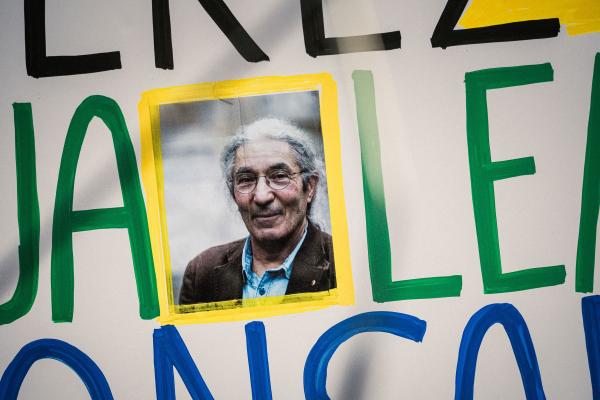
With Research Fellow Zineb Riboua, Ambassador Zimeray will examine the legal, political, and strategic implications of Sansal’s detention and what it reveals about freedom of expression under authoritarian regimes.
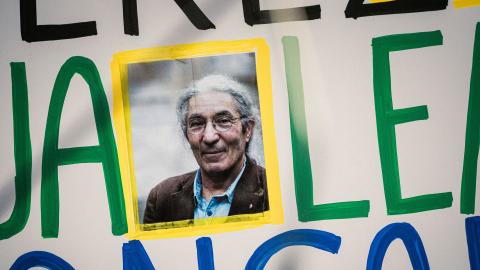

A panel of experts will discuss how the Japanese government should approach domestic political questions, its partnership with America, and Japan’s role in the world.
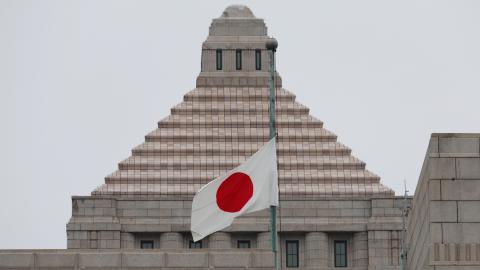

Hudson will welcome Senators Mark Kelly (D-AZ) and Todd Young (R-IN) to discuss their proposal to restore America’s shipping and shipbuilding industries to help deter Chinese aggression.


Major General Mark Mitchum will discuss the Air Force’s nascent Integrated Capabilities Command.

